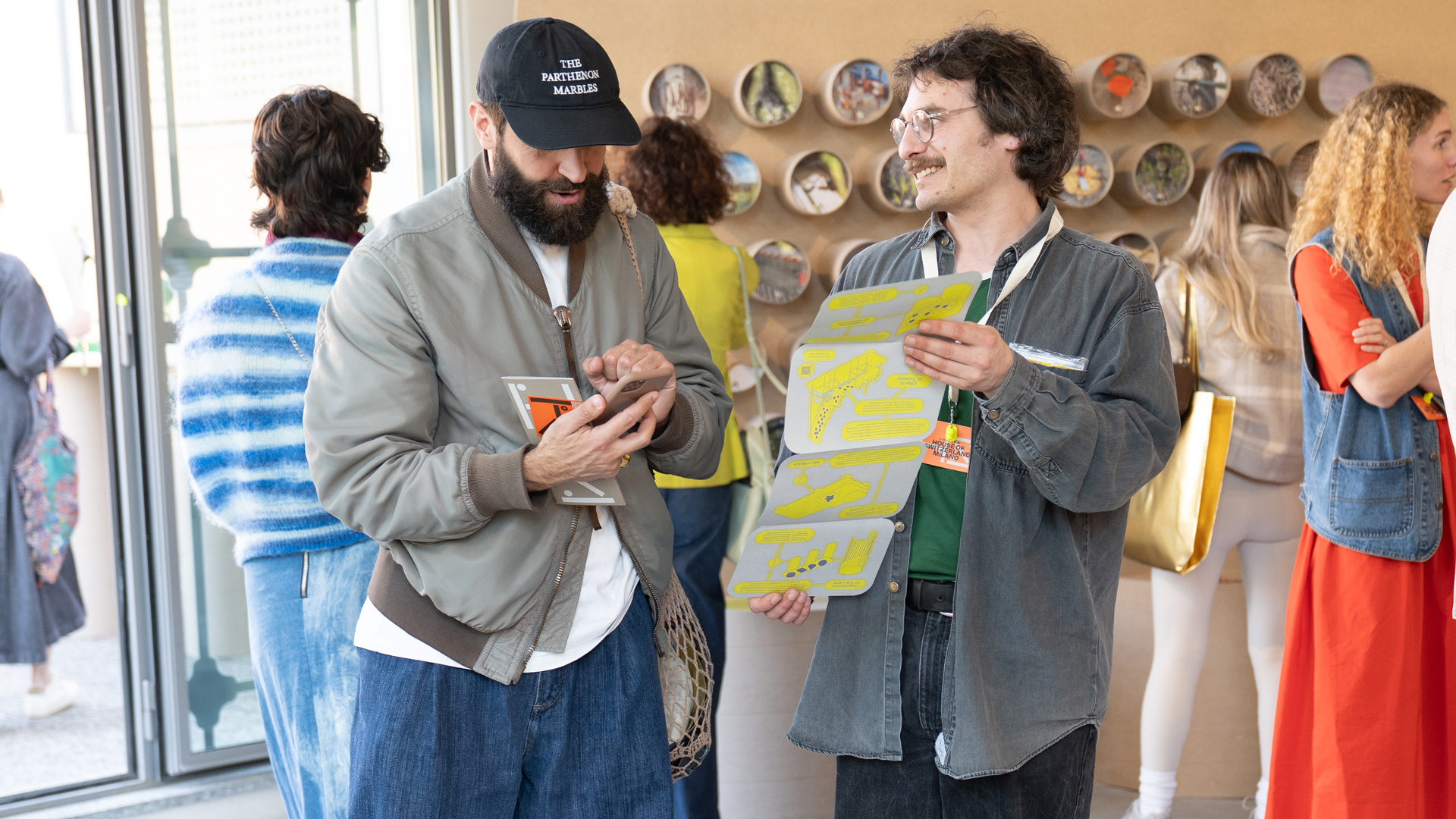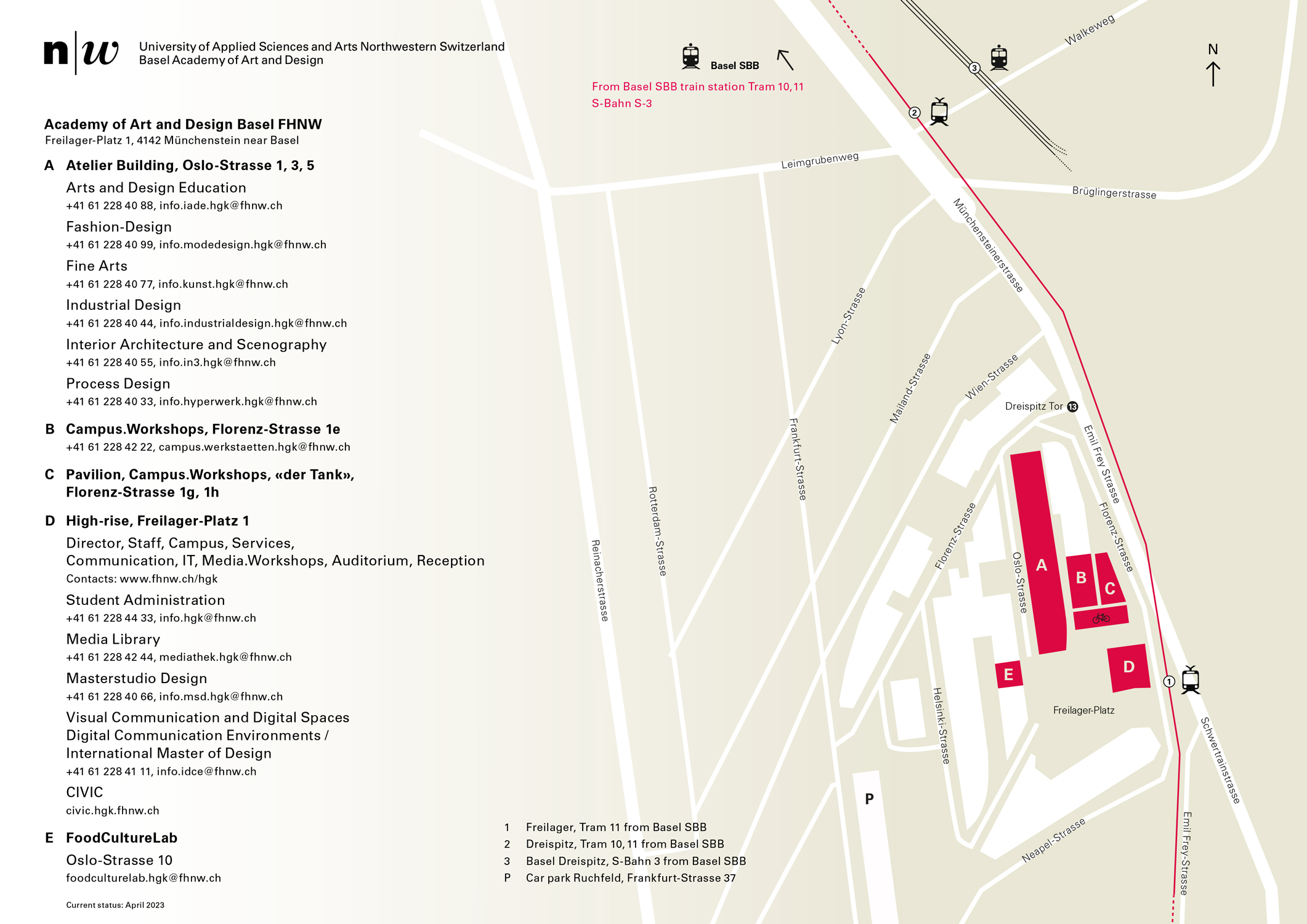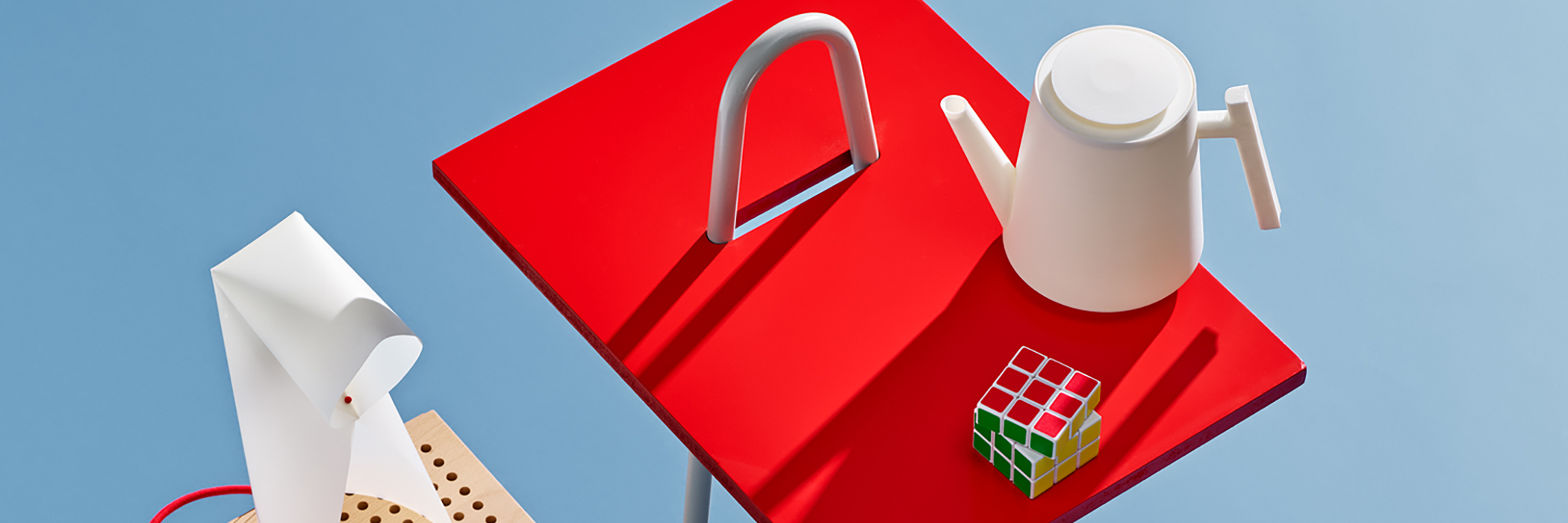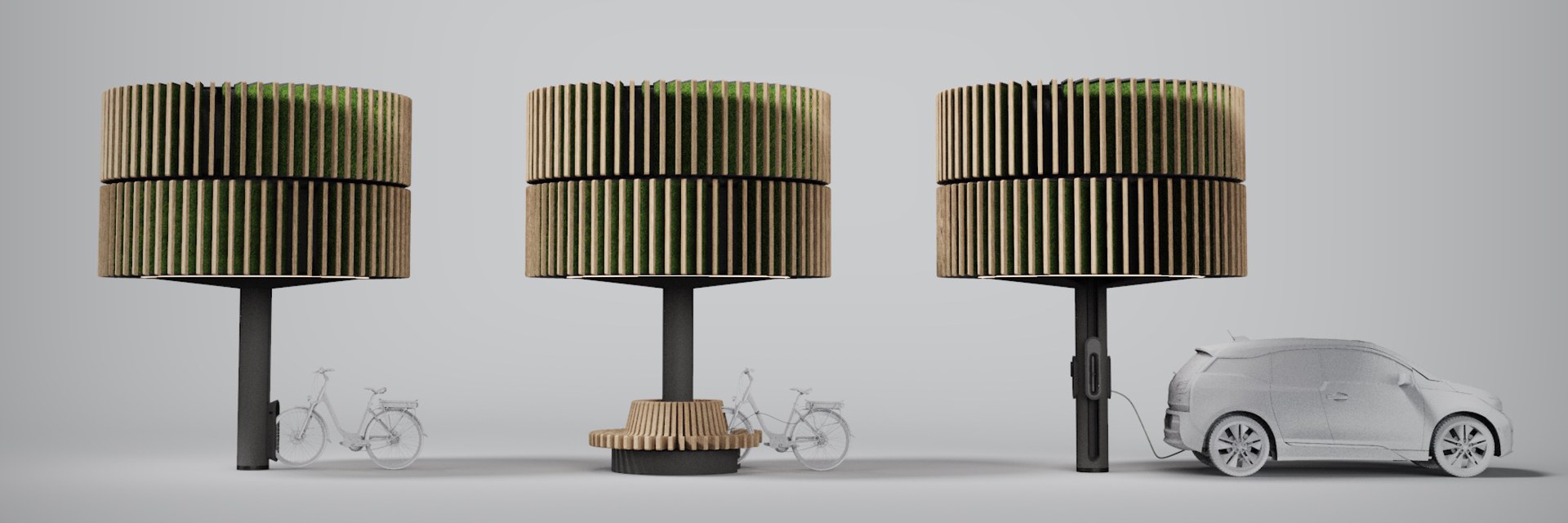Industrial Design BA
Aesthetics, usability, materials, emotional impact, legibility, formal value: the design of serially produced goods draws on the knowledge of various disciplines. To assume an active role as designers in an era of rapid social change, students learn how to approach their own discipline with confidence and how to deal with related areas in a professional and socially competent manner.
Key data
- Degree
- Bachelor of Arts FHNW
- ECTS points
- 180
- Study start
- September (week 38)
- Next start
- Mon. 14.09.2026 | Fall Semester
- Final application date
- Sun, 15.02.2026
- Studying mode
- fulltime
- Duration
- 6 semester
- Teaching language
- German (B2 or equivalent), partly in English
- Place
- Basel
- Stay abroad
- possible
- Application fee
- CHF 200.- (incl. aptitude assessment and enrolment)
- Semester fee
- CHF 750 (CH); CHF 1.000 (EU); CHF 1.250 (Not-EU/EFTA) Fees detail
Application for the Bachelor's programme in Industrial Design.
Mobile navi goes here!



Information on programme contents
Aesthetics, usability, materials, emotional impact, legibility, formal value: the design of serially produced goods draws on the knowledge of various disciplines. To assume an active role as designers in an era of rapid social change, students learn how to approach their own discipline with confidence and how to deal with related areas in a professional and socially competent manner. As a basis for independent, critical design work, students get to grips with the conceptual, methodical and manual components of the creative, problem-oriented design process during their basic studies. The main study programme is focused on in-depth project work along the freely selectable focal points ‘introductory, practical and vision project’. To be able to address relevant current and future topics, the programme offers access to three laboratories: the Design Culture Lab provides a space for applying critical thinking and capturing new design perspectives. The Material@Sustainability Lab deals with sustainability issues, while the Digital Integration Lab offers an expanded perspective and infrastructure on the digital transformation.
Study structure
The courses offered reflect socially relevant issues: three labs were set up in order to address such issues in teaching. The Design Culture Lab offers the opportunity to apply critical thinking and understand new design perspectives. The Material@Sustainability Lab focuses on sustainability and the Digital Integration Lab gives our students a broader perspective and infrastructure with regard to the digital transformation. Students get to experience the latest design technologies such as three-dimensional sketching, virtual project presentations or coding.
Thematic focal points range from sustainable production to medical design and transport; from social innovation to home and living and interface design. It also addresses design questions related to capital and consumer goods. Critical reflection on the content and specifications as a requirement for innovative concepts and solutions is essential for doing so.
The degree programme Industrial Design targets inquisitive and creative minds who wish to design and change things. It addresses students who are not interested only the form and function of serial goods but also wish to know how these products are used and in what contexts they develop impact. The degree programme calls for a wide range of interests on the part of the students and a curiosity to understand the social, cultural, economic, and technological challenges society faces. Hereby the focus is on the perspective of users. Apart from conceptual aspects, major emphasis is placed on the practical, hands-on design work including the materials, existing procedures as well as new technologies.
As a graduate of the Industrial Design bachelor’s programme, you can expect a multifaceted professional field, in some cases highly specialised. You will be in a position to work in companies’ design departments and at design studios or to start your own business. In the context of information and communications technology, many new fields of activity for Industrial Design – such as in the area of digital services – are opening up. If you are aiming at leadership job in the design field, teaching or academia, continuing your education in our Industrial Design master’s programme is an ideal way of preparing for it.
With its studios and central Campus.Workshops, HGK offers ideal conditions for combining craft curiosity, the acquisition of technical skills, and the necessary digital know-how. In addition, all students have their own 24/7 workspace in one of the spacious studios. In the degree programme Industrial Design, students experiment with the classical tools and machines used in wood, metal, and plastic processing but also with cutting-edge equipment such as laser cutters, CNC milling machines, and 3D printers. They develop prototypes out of numerous and different materials made available by the Institute. They have access to the Digital Integration Lab allowing them to work with virtual reality, 3D scanning, Arduino and Raspberry Pi, and AI. The facilities are open to students 365 days a year.
Information on admission, aptitude assessment and admission to the study programme
Educational requirements
For admission to the aptitude assessment for the bachelor’s programmes in Design (Industrial Design, Interior Architecture and Scenography, Fashion Design, Process Design, Visual Communication and Digital Spaces), one of the following qualifications is generally required:
- a certified vocational baccalaureate
- a certified specialized baccalaureate
- a certified upper secondary school (level II) baccalaureate
- proof of an equivalent educational degree at an upper secondary school (level II) obtained otherwise (Swiss education system)
Language of tuition
The language of tuition is German (B2 or equivalent). Proof of language proficiency is required at the start of the degree programme.
Workplace experience or preparatory course in Design
In addition, candidates need to provide proof of one year of workplace experience or completion of a two-semester preparatory course in Design.
Is a list of approved vocational trainings and professional fields, respectively.
Catching up on the vocational baccalaureate
Applicants who have not completed at least three years of upper secondary schooling (level II) are not legally entitled to admission to a Bachelor's degree programme. Information concerning full-time or part-time on-the-job training courses focusing on a vocational, design-based or specialized baccalaureate is provided by the local vocational colleges.
Admission on the basis of exceptional talent (1)
In exceptional cases, applicants can be admitted to the Bachelor’s degree programmes without being in possession of an upper secondary school (level II) certificate (Swiss education system), namely if they can provide proof of exceptional talent, either in a design-related or an arts-related field.
Note: We recommend that you make enquiries by means of an email to the office of the respective degree programme at admission.BA-industrialdesign.hgk@fhnw.ch at least two weeks prior to the application deadline (15 February), or arrange an appointment with the Head of the degree programme.
____________
(1) If you are in possession of one of the following educational degrees, you are eligible for this mode of admission:
Federal Certificate of Vocational Proficiency EFZ (apprenticeship), Professional Certificate EBA, Specialized Secondary School (FMS), Compulsory Schooling, no educational qualification
To apply for a place at the HGK Basel, the required documents must be submitted by deadline 15.02.2026.
Please send the specific enquiries to email address.
Dates aptitude assessment 2026
- 01.11.2025
Publication of the detailed information on the aptitude assessment - 15.02.2026
Registration deadline and deadline for submitting the required documents for the aptitude assessment. - 07.- 11.09.2026
Introductory weeks at the HGK Basel (mandatory) - 14.09.2026
Fall Semester begin 2026/27
Here you will find answers to FAQs about preparing and registering for a Bachelor’s (BA) or a Master’s (MA) degree programme at the HGK Basel FHNW.
Here you will find answers to organizational, administrative and legal questions all about studying -->
Further information Industrial Design

Public transport
The campus is easy to reach by public transport. The stop Freilager on BLT line 11 is immediately in front of the Campus (from Bahnhof SBB in direction Aesch)
By car
Leave the motorway A2 at the junction Basel-St. Jakob and follow the sign Dreispitz. Approaching from Münchensteinerstrasse enter the Dreispitz complex through Gate 13 and park your car in one of the public car parks (Ruchfeld or Leimgrube). When setting your satnav, please note that the Freilager complex is part of the municipality of Münchenstein, Canton Basel-Landschaft.
Access by car for people with disabilities
Choose the access via Florenz-Strasse in the direction of the High-rise building (Building D). To lower the bollard at the gates of the campus please ring the bell. You will be connected to our reception in Building D.

The buildings of the HGK Basel are accessible by wheelchair, stroller, and for people with walking difficulties. The entrance to the highrise building (Building D) is at ground level, the studio building (Building A) can be reached via a ramp. There is at least one lift in both buildings.
Access by car for people with disabilities: See Gender-neutral toilets: See ‘Getting there‘.
Toilets for people with disabilities:
Highrise building (Building D): Ground floor to 8th floor in the centre of the building
Studio building (Building A): Ground floor to 3rd floor, southern section of main corridor
Gender-neutral toilets: See ‘All Welcome WC’.
Parent-child-room: See 'Parent-child-room'.
Basel Academy of Art and Design FHNW
Institute Contemporary Design Practices (ICDP)
Postfach
(P.O. Box)
CH-4002 Basel
Basel Academy of Art and Design FHNW
Institute Contemporary Design Practices (ICDP)
Industrial Design BA degree course
Oslo-Strasse 3
4142 Münchenstein near Basel
Building: A 0.13
Phone: +41 61 228 40 44
Fax: +41 61 228 42 87
Email: info.industrialdesign.hgk@fhnw.ch
No social media links available.

